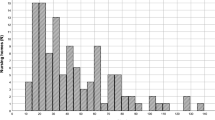Abstract
To address the risks of aspiration pneumonia, patients with dysphagia may be prescribed a modified diet. The goal of diet modification is to decrease the risk of patients aspirating food due to their diminished swallowing reflex. Some patients may not accept diet modification or may not adhere to the treatments identified by the interdisciplinary team. Such scenarios may result in important moral uncertainty and concern for clinicians. As a result of several ethics consultations related to this issue, a working group of the Clinical Ethics Committee at the Jewish Rehabilitation Hospital in Laval, Quebec, Canada, developed a framework for responding to situations when patients do not adhere to recommended diet modification. The goal of this tool is to facilitate discussion and collaboration between clinicians and patients, to clarify assumed versus real risk, and to promote shared decision-making in dysphagia care. In this article we examine the clinical context of diet modification for patients with dysphagia in rehabilitation hospitals, explore ethical aspects of this topic, present the clinical algorithm, and discuss our experience with developing and piloting this tool.

Similar content being viewed by others
References
Martino R, Foley N, Bhogal S, Diamant N, Speechley M, Teasell R. Dysphagia after stroke: incidence, diagnosis, and pulmonary complications. Stroke. 2005;36:2756–63.
Smithard DG, O’Neill PA, England RE, Park CL, Wyatt R, Martin DF, Morris J. The natural history of dysphagia following a stroke. Dysphagia. 1997;12:188–93.
Smithard DG, O’Neill PA, Parks C, Morris J. Complications and outcome after acute stroke. Does dysphagia matter? Stroke. 1996;27:1200–4.
Sharp HM, Bryant KN. Ethical issues in dysphagia: when patients refuse assessment or treatment. Semin Speech Lang. 2003;24(4):285–99.
Low J, Wyles C, Wilkinson T, Sainsbury R. The effect of compliance on clinical outcomes for patients with dysphagia on videofluoroscopy. Dysphagia. 2001;16:123–7.
Parker C, Power M, Hamdy S, Bowen A, Tyrrell P, Thompson DG. Awareness of dysphagia by patients following stroke predicts swallowing performance. Dysphagia. 2004;19:28–35.
Rosenvinge SK, Starke ID. Improving care for patients with dysphagia. Age Ageing. 2005;34:587–93.
Colodny ED. Construction and validation of the mealtime and dysphagia questionnaire: An instrument designed to assess nursing staff reasons for non-compliance with SLP dysphagia and feeding recommendations. Dysphagia. 2001;16:263–71.
McCullough KC, Estes JL, McCullough GH, Rainey J. RN compliance with SLP dysphagia recommendations in acute care. Top Geriatr Rehabil. 2007;23(4):330–4.
Hunt MR, Ells C. Partners towards autonomy: relational autonomy and risky choices in rehabilitation care. Disabil Rehabil. 2011. http://informahealthcare.com/doi/abs/10.3109/09638288.2010.515703.
Browne A. Helping residents live at risk. Camb Q Healthc Ethics. 2003;12:83–90.
Sharp HM. Ethical issues in the management of dysphagia after stroke. Top Stroke Rehabil. 2006;13(4):18–25.
Banja JD. Risk assessment and patient autonomy. J Head Trauma Rehabil. 1994;9(4):70–2.
Macciocchi SN, Stringer AY. Assessing risk and harm: the convergence of ethical and empirical considerations. Arch Phys Med Rehabil. 2001;82(Suppl 2):S15–9.
Beauchamp TL, Childress JF. Principles of biomedical ethics, 6th edn. New York: Oxford University Press; 2009.
Bergsma J, Thomasma DC. Autonomy and clinical medicine: renewing the health professional relation with the patient. Dordrecht: Kluwer Academic Publishers; 2000.
Sherwin S. A relational approach to autonomy in health care. In: Sherwin S, editor. The politics of women’s health: exploring agency and autonomy. Philadelphia: Temple University Press; 1998. p. 19–47.
Donchin A. Understanding autonomy relationally: toward a reconfiguration of bioethical principles. J Med Philos. 2001;26(4):365–86.
Acknowledgments
Members of the dysphagia working group that developed the algorithm include Franceen Kaizer, Sandra Prizio, and Anna-Maria Spiridigliozzi. We thank Jane Chambers Evans and the members of the Jewish Rehabilitation Hospital Clinical Ethics Committee for their valuable input during the development of the algorithm. We also thank Annie Dicaire for her editorial assistance and Irene Shanefield for her contribution to the literature review. Matthew Hunt’s research is supported by a postdoctoral fellowship from the Canadian Institutes of Health Research.
Author information
Authors and Affiliations
Corresponding author
Rights and permissions
About this article
Cite this article
Kaizer, F., Spiridigliozzi, AM. & Hunt, M.R. Promoting Shared Decision-Making in Rehabilitation: Development of a Framework for Situations When Patients with Dysphagia Refuse Diet Modification Recommended by the Treating Team. Dysphagia 27, 81–87 (2012). https://doi.org/10.1007/s00455-011-9341-5
Received:
Accepted:
Published:
Issue Date:
DOI: https://doi.org/10.1007/s00455-011-9341-5




